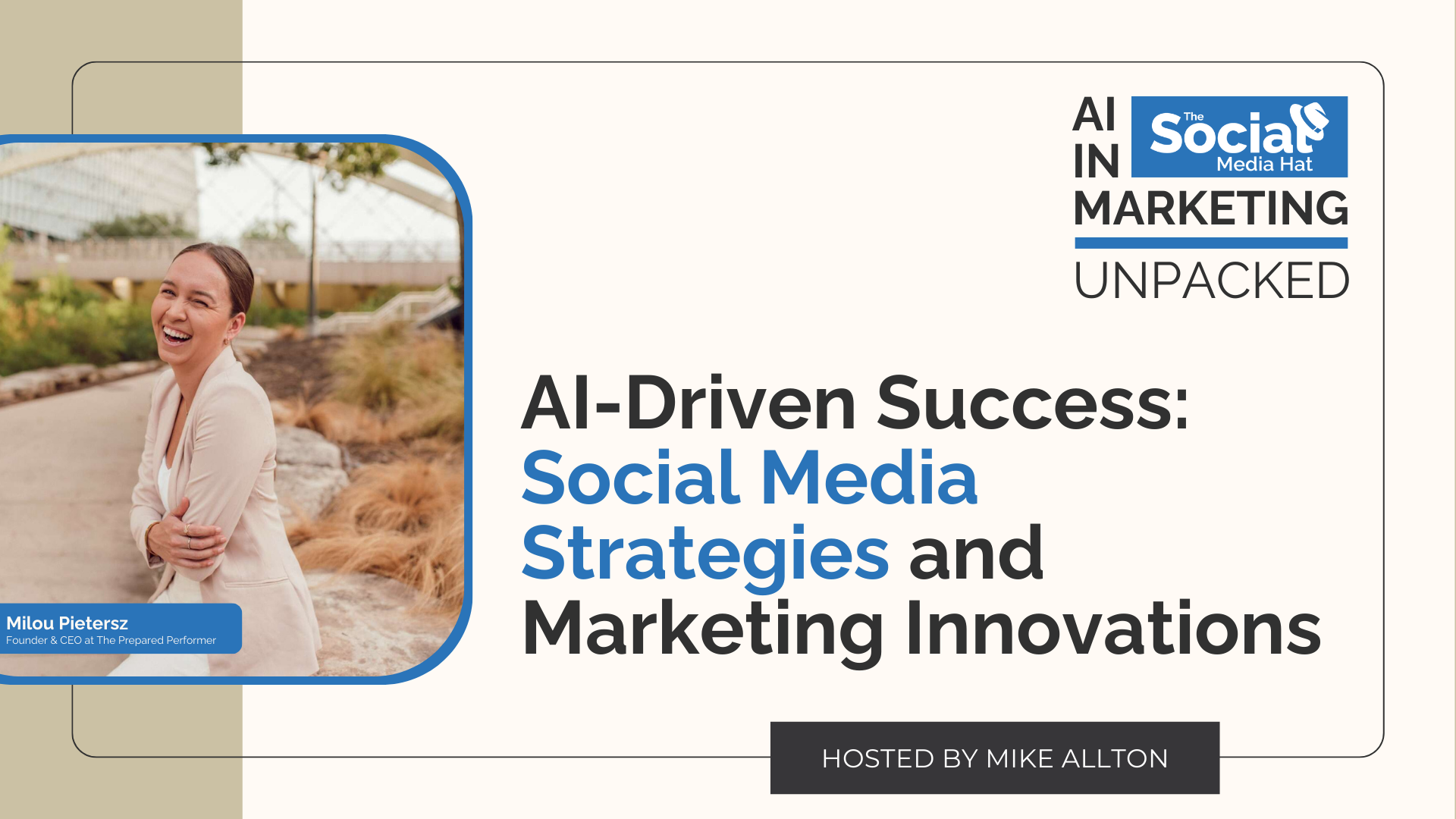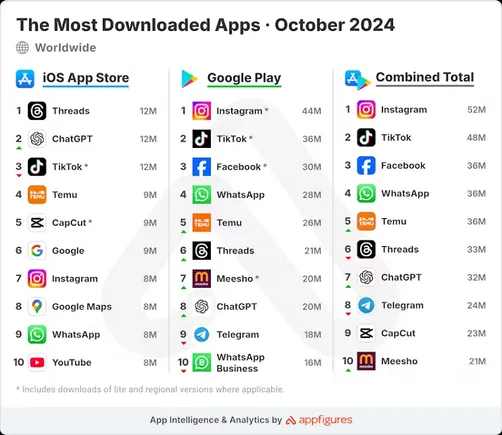Reading Time: 18 minutes
How is AI transforming the world of marketing and social media?
As artificial intelligence continues to evolve, it’s revolutionizing the way businesses approach their marketing strategies, making processes more efficient and outcomes more impactful.
But what does this mean for marketing agencies and social media influencers?
LISTEN TO AI IN MARKETING: UNPACKED:
WATCH AI IN MARKETING: UNPACKED:
Today, we’re joined by Milou Pietersz, founder and CEO of Simply Multimedia. Milou’s journey from UberEats driver to leading a successful marketing agency is inspiring, and her innovative use of AI in marketing and social media is nothing short of revolutionary. She’ll share insights into how AI is being utilized within her agency, how it’s benefiting her clients, and her vision for the future of AI in marketing.
AI in Marketing: Unpacked host Mike Allton asked Milou Pietersz about:
✨ Integrating AI in Marketing: Learn how AI can transform social media marketing strategies, making workflows more efficient and outcomes more effective.
✨ AI Tools for Social Media: Discover the specific AI tools Milou uses within her agency to enhance social media marketing.
✨ Future Trends in AI and Marketing: Gain insights into the future of AI in marketing and how to stay ahead of the curve.
Learn more about Milou Pietersz
Resources & Brands mentioned in this episode
Full Transcript
(lightly edited)
AI-Driven Success Social Media Strategies and Marketing Innovations with Milou Pietersz
[00:00:00] Milou Pietersz: I think AI is only getting smarter. I mean, you talk about chat GPT, you’re now noticing, I even notice it when I use sometimes client’s names, whether it’s big creators or that it can recognize who they are and their voice and give you info on them. And so I do think it’s an exciting thing for the future as it keeps developing, getting smarter.
Again, I don’t think it ever replaces humans, but as long as you’re keeping up with it, right, are you evolving along with AI and how it can better you and your agency, or are you completely taking a backseat and saying no to it and not being open minded? So I think you really need to take a position there to where you can grow along with it and stay open minded to what, how it can actually help versus how it can only harm people.
[00:00:47] Mike Allton: Welcome to AI in Marketing: Unpacked, where we simplify AI for impactful marketing. I’m your host, Mike Allton here to guide you through the world of artificial intelligence and its transformative impact on marketing strategies. Each episode, we’ll break down AI concepts into manageable insights and explore practical applications that can supercharge your marketing efforts.
Whether you’re an experienced marketer just starting to explore the potential of AI, this podcast will equip you with the knowledge and tools you need to succeed. So tune in and let’s unlock the power of AI together.
Greetings program. Welcome back to AI in Marketing: Unpacked. Why selfishly use this time to pick the brains of experts at keeping up with and integrating or layering artificial intelligence into social media, content, advertising, search, and other areas of digital marketing. And you get to learn to subscribe to be shown how to prepare yourself and your brand for this AI revolution and come out ahead.
Now, how is AI transforming the world of marketing and social media? As artificial intelligence continues to evolve, it’s revolutionizing the way businesses approach their marketing strategies, making processes more efficient and outcomes more impactful, but what does this mean for marketing agencies and social media influencers today?
We’re joined by Milou Pietersz, founder and CEO of Simply Multimedia. Mil’s journey from Uber Eats driver to leading a successful marketing agency is inspiring and her innovative use of AI and marketing and social media is nothing short of revolutionary. She’ll share insights into how AI has been utilized within her agency, how it’s benefiting her clients and her vision for the future of AI in marketing.
Hey, Mil, welcome to the show. Thanks
[00:02:25] Milou Pietersz: Hey, Mike. I’m so excited to be here. Thank you for the awesome introduction. I was smiling behind the scenes. But yeah, thank you for having me.[00:02:33] Mike Allton: Well, you’re amazing. I’m so glad to be able to have this time with you today. Could you start by just sharing a bit about your journey from the Uber Eats driver that you’ve talked about to founding your own marketing agency?[00:02:45] Milou Pietersz: Yeah, so it was at a time where I studied and graduated with a degree in media and advertising, which I very much loved. And the struggle was once upon graduation that it was very tough to actually find a job. I always dreamt of working for a big agency. I was a student athlete prior and during college, and it was actually very tough to find a position.
worthy of now having that degree, right, and stepping into the real world. And so I kind of took it up on myself to then create my own job. I was coaching at the time I was driving Uber Eats and any side hustles to take on to start building what is now simply multimedia.
[00:03:30] Mike Allton: That’s fantastic. And folks, if you’re not yet following Mil on Instagram and Threads and some of the other social channels, take that time after the show, we’ll have the links in the show notes because her social presence is spot on folks.
It’s amazing. You’ll learn just by following and consuming her content. But I’m wondering if you take yourself back to when you first started using a I. What initially sparked your interest in integrating AI into some of those marketing strategies?
[00:03:57] Milou Pietersz: Yeah, I think initially, just in general, we like to disrupt and stay ahead in marketing rather than, you know, being afraid of something unknown or something you don’t know a lot about because in the beginning, I think all of us didn’t know a ton about it.
And we as an agency really took it up on ourselves internally as a team to start testing again, internally, right? What works, what doesn’t work? How can it help us? How can we bring this to clients and make our work more efficient, maybe make it more cost effective for clients? And so the testing internally is really what then brought us to kind of talk about it more externally and publicly.
Because at this point, we knew, okay, this is how we want to use it and how we didn’t want to use it because, of course, there was a lot of pushback on AI as well. So we’re trying to tread carefully back then.
[00:04:48] Mike Allton: So we should kind of step back for a second and talk to me about your agency. What are the services that you’re currently offering?[00:04:55] Milou Pietersz: Yes. So we’re really a marketing agency that specializes in organic social media, PR, and also email. And this is like a trifecta we’ve formed over time. It started off really organic, social. We started doing a lot of PR. And then really the last piece we needed there was email to, you know, those conversions for the traffic we drive on social.
And so we organically kind of moved into those services. First again, testing it internally on my own brands and all of those good things before bringing it out to clients.
[00:05:29] Mike Allton: So you’re managing organic social media on behalf of other businesses. How has AI impacted or transformed the way that you’re approaching social media marketing for these kinds of clients?[00:05:40] Milou Pietersz: Yeah, I think a big thing is being more time efficient. So let’s say workflows, right? It has become a big part of the way using tools like Opus Clip, for example, that can help with video editing, especially clients who have long form content, where now all of a sudden someone or a video editor doesn’t have to sit down for hours and hours to generate clips, but from there on can edit it into, you know, better clips.
But really AI is there to assist us in so many of these things, whether it’s to summarize. Something we, we give it or giving you ideas when you’re kind of stuck, especially as an agency, where you work on multiple clients, right? Over and over again, every single month. It’s a great way to stay inspired, honestly, for us.
[00:06:28] Mike Allton: Fantastic. So we’re talking about brainstorming ideas. We’re talking about repurposing content. And you mentioned Opus Clip, which is fantastic. Are there any other tools specifically that you’re using within your agency to enhance workflows or anything else?[00:06:43] Milou Pietersz: Yeah, so a good workflow I use for myself having a YouTube channel and manage with my team is that I create a YouTube video, which is long format.
I can then take that into Opus Clip to generate all these different video promos to promote the actual episodes, I can then use many chats to automate leading people on Facebook and Instagram to the actual episode. And I can also take the link from YouTube and bring it into a tool called al right, and it actually turns it into a quote unquote, blog post.
But it transcribes the whole video and formats it into a blog, and I typically use that to create documents on LinkedIn where you create articles, right, in that format, so that people who don’t necessarily want to watch, they can, they can read the episode and link it back to the YouTube again. And again, those transcriptions can be used for any social content to where you don’t always want to consume video, right?
So you can take those transcriptions, turn them into quotes, into carousel posts, you name it, and it just saves so much time on everybody’s ends.
[00:07:53] Mike Allton: That’s fantastic. I’m doing very similar processes here with this podcast. I’m using AI to help me with the pre show to the research and that sort of thing to build up what I’m going to talk to a guest like you about.
And then once we’re done recording, I’m loading this entire recording into Descript and using Descript to help me not only edit but generate some of those clips and create. Yeah. I used then chat GPT to create an actual linkedin newsletter. That’s 100 percent AI generated and I see that on the newsletter this was written by CLU my AI assistant and it just it’s just a time saver right.
What about in the back end of your agency are using just off the top of my head any AI tools to help actually manage your agency or manage clients.
[00:08:35] Milou Pietersz: I wouldn’t say fully in that way. Like Some of the things that I feel like a lot of people have tapped into at this point is like having AI meeting note takers.
We we use Fireflies, but it’s actually funny because sometimes people think there’s an additional person there behind the screen, because I feel like we used to do that, right? Put a VA kind of off camera, like note taking. And so now we use the tool like Fireflies and I don’t need my entire team on calls all the time, right?
I think it’s a waste of time, and they can focus on other things. And all I would have to do is go into the summarized AI notes. Take the action items for everyone on that call, including myself, send it over. It takes a couple seconds and I give people their time back because they don’t need to be on a call with me and know what’s going on.
Everyone has the notes, they’re organized. I don’t have to dig through all the, all the whole call transcription. So I think that is probably the biggest one when it comes to managing clients. Because it is an important part of that workflow where you know, we meet with them, they need their items on where we’re at with everything.
[00:09:39] Mike Allton: That’s a fantastic example. I’ve just started doing some of that myself as of a month ago. I really wasn’t in meetings where I needed to have notes every single time, but now I am, some things have changed. And so, yeah, I’m using. Fathom dot a I and I love that email summary at the end because then I can pop that into the agenda and anybody in the company.
We have a lot of people who are curious about what other people in the company are doing. They can go look at the agenda and they can see the notes. So I love that suggestion. How are you balancing though the humanity, right? How are you keeping that delicate bounce between AI and human connections, particularly when it comes to social media marketing?
[00:10:18] Milou Pietersz: Yeah, I think that’s a great question. So it’s definitely not that AI replaces us as people, right? That’s why I feel like no one really has to be scared in that sense. Because it’s not that we have it completely take over. Yes, we use it to generate ideas, brainstorm, save time, but we’re not having, you know, AI write everything completely on behalf of a client.
Maybe that’s going to happen in the future. I’m not sure. But I think storytelling in general, that’s something that It’s very hard to replicate through something like AI and the humanity in content and all of those things. And so we’re very transparent with clients as well. We don’t want them to think that this is done by AI.
They know what is and isn’t. But I do think for agencies that might want to offer that they can be transparent with clients and say we can offer maybe three extra posts a month. They are AI generated, but it costs you half the money that If we were to write it ourselves. So I do see there are a lot of opportunity on things you can do there, but we personally don’t have AI actually write copy and things like that.
At the moment.
[00:11:28] Mike Allton: That makes a lot of sense. I was literally just on someone else’s podcast before jumping into our recording here, and then we were talking about storytelling and he asked me that question, is AI replacing storytelling? And it can’t, it can’t be on a call. with another human being, asking them questions and pulling out the details of their story.
Like I’m doing with customers for Agorapulse and that sort of thing. I was on a call last week, an interview with Potter’s resorts in the UK about how they came out of COVID during the pandemic. When most places are closed, they open a second location and went all inclusive with their dining, which is just crazy.
And in the middle of that conversation turned out they were depending on their community and they were using Agorapulse to To build and manage their community. And that’s what allowed them to stay in business throughout the pandemic. I didn’t even know they were Agorapulse customers and that wouldn’t have come out if I wasn’t having that personal human conversation.
So AI is fantastic. Obviously that’s why I’m doing this show, but it’s, there’s a tool to help us do what we’re doing in our everyday lives. Folks were talking with Mil about how she’s integrating AI into her agency. Into our client work. And we’ve got a lot more ground to cover, but first let me share with you the tool that I’m using every day to prep for podcasts, general ideas, and repurpose content.
This episode of AI in Marketing: Unpacked is brought to you by Magai, your gateway to making generative AI incredibly simple and accessible. Wondering how to seamlessly integrate AI into your marketing strategy without getting bogged down by complexities. That’s exactly where Magai shines. It provides user friendly AI solutions that empower marketers just like you to innovate and elevate your campaigns without needing a degree in science.
Imagine having the power to generate creative content, insightful marketing data analysis, or even personalized customer communications. All at the touch of a button. Magai isn’t just about providing tools. It’s about. transforming your approach to marketing with AI that’s tailor made to be straightforward and effective.
So whether you’re looking to boost your content creation process or want deeper insights into your marketing performance, Magai makes it all possible with a few clicks, no fuss, no hassle, just results. Ready to simplify your AI journey? Visit Magai today to learn how their solutions can revolutionize the way you engage with your audience.
with your audience. Don’t just market market smarter with Magai. Tap the link in the show notes. So a moment ago, you were sharing some of the tools that you’re using and how those are being applied. How are those giving you advantages? What are some of the advantages that you’re seeing by using AI in some of these marketing campaigns?
[00:14:00] Milou Pietersz: Yeah, so the biggest advantage again, I think is time efficiency, right? We, you know, we want to do more in in less time. And so clients get more out of us more output so that we can focus on The things like strategy that I’m not just gonna have AI strategize certain things, right? That’s really where we come in or executing creativity I even have moments where I really feel stuck on the creativity and I do lean on AI to help me out Come up with an idea or format something and it really keeps the ball rolling, right?
Because that’s the thing with creativity and marketing in general. You can’t really put like a time sense to it because Sometimes it takes longer than other times so that has really, really helped and benefited us in so many different ways.
[00:14:51] Mike Allton: Time is absolutely a huge advantage. I mean, I’ve already talked about how it’s helping me be more efficient.
Can you think of a time when AI has actually improved the outcome? It’s like we said, we’re shaving time, but I know a lot of people are concerned about like the quality of the copy of the imagery or anything like that. Can you think of a time where it’s actually been an improvement to a campaign?
[00:15:13] Milou Pietersz: So I think with that because we’re all like focused on organic, it goes back to improving a campaign in terms of we were able to increase our output by X amount.
And that would improve a campaign because now you have higher reach, you have higher numbers in general, and you may have not been able to do that without AI because then you would need a team to sit down and create it. 10 different pieces of content. So in that sense, I would say we have seen it improve because we’re able to crank up that output.
But again, like we are focused really on organic itself. And then I do think a lot of tools have AI integrated into maybe their reporting, right? Whether it comes to email or just marketing in general, and it can give you better predictions. So I think that is another thing where some of us aren’t strategists, or some of us don’t want to focus on old numbers all the time.
So that way you can rely on AI to help you out there and give you the stats. So I think that is another thing.
[00:16:12] Mike Allton: That’s, that’s a huge point, right? If we’re able to look at past campaigns with the help of AI and understand why they performed or didn’t better than we ever before, that’s going to inform and improve the next campaign.
And the next campaign we talked with Eva Dong from McKinsey and co on a recent episode, all about the campaigns and the data analysis that AI can do. And she was making some really interesting points about how, for instance, to your point. If we use AI to become more efficient, we can then create far more materials and that’s going to have hopefully a positive impact on a specific KPI.
Like she was talking about revenue, right? If you create like 10 ad campaigns instead of one ad campaign, because that’s now you’ve got that time to do that. You can drive more revenue, but there’s also going to be a trade off where not it’s All of those campaigns are going to perform as well as that one campaign you might have created before.
These are just some of the concepts that have to be brought into play when now we’re using AI in these new and innovative ways. And sometimes those can be obstacles or even challenges. So what are some of the challenges that you’ve encountered when implementing AI and how maybe have you overcome them?
[00:17:23] Milou Pietersz: I think one of the biggest challenges you really have to know the tools yourself and what it’s doing. Because otherwise, I really feel like it makes people kind of lazy and sit in the backseat. And that’s one thing I always wanted to avoid in the agency, like for any of our team members and including myself, I need to know what’s actually going on versus just relying on the tool.
Because we all know AI is not always correct. It’s not always reliable. And so if you don’t know how to do it or don’t have the skill, you have nothing to fall back on. So I think that in general is the biggest obstacle for everyone. And yeah, overcoming that is by knowing how to do it yourself first before just relying on AI, always fact checking and making sure it doesn’t become like a blind tool for you to rely on.
[00:18:09] Mike Allton: That is a huge point. Thanks for sharing that just yesterday I was using chat GPT where here at Agorapulse, I’m doing training for our sales team on new content assets that are coming out because we produce so much content at Agorapulse, it’s crazy. And so I was feeding like blog content in the chat GPT and I told it the format that I wanted to give me a script to record.
So it’s basically looking at the blog post, determining who this is for and creating a summary and some of the key points, that sort of thing. And. I could have just taken the summary and copied and pasted and then read it into video, but I can’t do that because I know AI can make mistakes. So I’m looking at it and realizing that in one of the segments, I started talking about Agorapulse features that weren’t actually talked about in the article.
And it’s like, Oh, wait, wait, wait, you need to limit yourself to what’s in the content I give you. Yeah. Understand to your point, how to use the tools. And in this example, we have to know how to give the AI guardrails in context and limits and specific instructions. If we’re talking about prompt engineering and that sort of thing.
[00:19:13] Milou Pietersz: Yeah.[00:19:15] Mike Allton: In previous episodes, I’ll link to that for you folks in the show notes. If you haven’t really got into prompt engineering, but I’m wondering, how do you see the role? of AI in marketing evolving over the next few years.[00:19:28] Milou Pietersz: I think AI is only getting smarter. I mean, you talk about chat GPT, you’re now noticing, I even notice it when I use sometimes clients names, whether it’s big creators or that it can recognize who they are and their voice and give you info on them.
And so I do think it’s an exciting. thing for the future as it keeps developing, getting smarter. Again, I don’t think it ever replaces humans. But as long as you’re keeping up with it, right? Are you evolving along with AI and how it can better you and your agency? Or are you completely taking a backseat and saying no to it and not being open minded?
So I think you really need to take a position there to where you can grow along with it and stay open minded to how it can actually help versus how it can only harm people.
[00:20:16] Mike Allton: Does anything about AI’s rapid development concern you at this point?[00:20:22] Milou Pietersz: I think, you know, sometimes when you really see it, sit down and think very deeply on like, yeah, it can replicate anyone’s face or turn it into videos.
You know, obviously we’re in a political season right now. A lot of the fake news being spread and like what’s real, what’s not. And I think that’s the biggest thing. But at the same time, Is that something we’ve never had before, you know? Like, people can always spread misinformation, fake news, or scam people.
So I think it’s just something we need to get used to. And I’m sure it will develop over time with better policies. I know platforms like Instagram, even YouTube, are coming up with features to label your content. And maybe there will be penalties. I think YouTube may have penalties if you don’t. Point out what is a I?
So I think we’re evolving along. Of course, it’s still a bit scary thinking about it right now, but I’m not too concerned.
[00:21:15] Mike Allton: Yeah, we’re definitely evolving into your point. Yeah, I know Instagram has automatic labels. In fact, I had shared a picture of my daughter. And it labeled it as AI generated. I don’t know why it was very strange and it wouldn’t remove the label either.
I mean, I, you know, I refuted it. I mean, it wasn’t a big deal. It’s not like I was being penalized at that time, but I was like, this is not AI. It shouldn’t say AI underneath it, but it is what it is. I know it’s a learning process. I I’m, I’m patient platforms. They they’ve got to learn along with the rest of us.
So what advice would you give to marketers who or agencies or just beginning to explore? AI’s potential, they’re wondering, you know, where they should start, how, what role should it fit into their business? What advice do you have?
[00:22:01] Milou Pietersz: I would say start simple, you know, like the brainstorming content ideas depending on what type of agency you have But do get educated and start tapping into those Different platforms and tools that are out there because that’s the whole thing too about AI Especially when it was such a trend just coming out where there you got a million tools thrown at you, and not every tool is really that great necessarily.
And so if you want to be efficient with your time and make the most out of AI, really see for yourself what is actually going to help you versus maybe cost you more time. Because that’s what I sometimes find with some of these tools. It costs more time to actually go through the process and fact check and whatnot than doing it yourself.
So I think. Be picky about it. But don’t get left behind by you know, being against it or being afraid of it. Stay open minded is really the biggest advice I can give.
[00:22:57] Mike Allton: That’s terrific advice. And then we’ve talked a lot about different tools today and I know some of them are pure AI tools. Some of them have AI more built in and integrated.
Do you have a particular favorite?
[00:23:09] Milou Pietersz: I think Opus Clip is, has been huge just because for my YouTube it’s pretty, Probably one of my favorites. And many chat me being so active on Instagram again has helped me a ton cause they rely on some AI tools there. So that would be probably my top two out there right now.[00:23:25] Mike Allton: Fantastic. And we know the folks at OpusClip, they’re amazing, amazing group of folks, you’ve been absolutely terrific. And this has been such a great and informative interview. I know folks listening are going to feel very reassured by, by you as a successful how did you put it? You are. A business owner with influence, not an influencer with a business.[00:23:47] Milou Pietersz: Yes, exactly. Yeah, it was something that was on my mind for a while. And I told my team and they were like, Oh, you need to post that. I was like, I don’t know. I don’t want people. I wanted people to get the message, but not in a wrong way. But yeah, I see myself as a business owner with influence rather than an influencer with a business.[00:24:05] Mike Allton: Yeah that you are that you are for folks who want to connect with you and follow you. Where should they go?[00:24:10] Milou Pietersz: Yeah, I think it’s probably best on instagram where i’m very active. I do have a youtube channel for social media marketer So if you are a social media marketer or have someone in your agency I have a ton of free training there that you can binge watch on YouTube.
That I think is super helpful.
[00:24:27] Mike Allton: Terrific. We’ll have all the links in the show notes. That’s all we’ve got time for today. Friends. Don’t forget to find the AI in marketing Unpacked podcast on Apple and leave us a review. We’d love to know what you think until next time. Welcome. Thanks for joining us on AI in Marketing: Unpacked.
I hope today’s episode has inspired you and given you actionable insights to integrate AI into your marketing strategies. If you enjoyed the show, please subscribe on your favorite podcast platform and consider leaving a review. We’d love to hear your thoughts and answer any questions you might have.
Don’t forget to join us next time as we continue to simplify AI and help you make a real impact in your marketing efforts. Until then keep innovating and see just how far AI can take your marketing. Thank you for listening and have a fantastic day.

Related
Discover more from The Social Media Hat
Subscribe to get the latest posts sent to your email.










